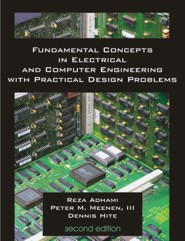
Fundamental Concepts in Electrical and Computer Engineering with Practical Design Problems
Second Edition
by Reza Adhami, Peter M. Meenen, III, and Dennis Hite

Synopsis
In many cases, the beginning engineering student is thrown into upper-level engineering courses without an adequate introduction to the basic material. This, at best, causes undue stress on the student as they feel unprepared when faced with unfamiliar material, and at worst, results in students dropping out of the program or changing majors when they discover that their chosen field of engineering is not what they thought it was. The purpose of this text is to introduce the student to a general cross-section of the field of electrical and computer engineering. The text is aimed at incoming freshmen, and as such, assumes that the reader has a limited to nonexistent background in electrical engineering and knowledge of no more than pre-calculus in the field of mathematics. By exposing students to these fields at an introductory level, early in their studies, they will have both a better idea of what to expect in later classes and a good foundation of knowledge upon which to build.
About the Author
Dr. Reza Adhami serves as both a professor and the Chair of the Electrical and Computer Engineering Department at The University of Alabama in Huntsville (UAH). He has been a member of the electrical engineering faculty at UAH since 1983. During that time he has held many positions including Instructor, Associate Professor, Assistant Professor, Professor, Chair of the department, and Chair of the Inter-Campus Program Coordinating Board for the Shared Ph.D. degree in Computer Engineering at the University of Alabama in Birmingham and The University of Alabama in Huntsville. His research interests include communication systems, signal processing, image processing, biomedical systems, and VLSI. More specifically, his work has involved such topics as wavelet theory and its applications in signal processing, biomedicine and biometrics. As a faculty advisor, he has successfully supervised numerous Masters Theses and Ph.D. dissertations. He has authored/co-authored over 100 technical papers that have be





 View or Post a Review at Amazon.com
View or Post a Review at Amazon.com